I asked for questions about nuclear energy and as I got a lot of questions fast, I'm answering them already. Thank you for all the questions I was sent!
One of the main concern with nuclear power is the nuclear waste. Even though nuclear power plant accidents are feared too, it seems to be well known that modern power plants are safe. However the nuclear waste management is still at a somewhat sad state.
I'm hoping the fear towards nuclear energy would be set aside and we could finally get more environmentally friendly nuclear power. Currently it is our best alternative to replace fossil fuels.
"do you think one day we will have fully nuclear powered cars?" @steemit-nz
Decades ago they had a concept for a nuclear powered car, but the main issues are the radiation and reactor size. If you want to be protected from the radiation, you'd need heavy shielding. Because of the heavy shielding, the car would be super-heavy. Even without the shielding, reactors are too large and heavy to be good options for cars. Even if someone could find a solution to the weight and size issues, we'd still have the risk of criminals and terrorists breaking in cars to steal nuclear materials for their own use.
Luckily we can get kind of nuclear powered cars, if we have electric cars and a strong increase in nuclear power generation. We wouldn't have the nuclear reactor within the car, but the electricity could be originated from the nuclear power plant.
If you want to read a short wikipedia article about the Ford concept car, you can find it here.
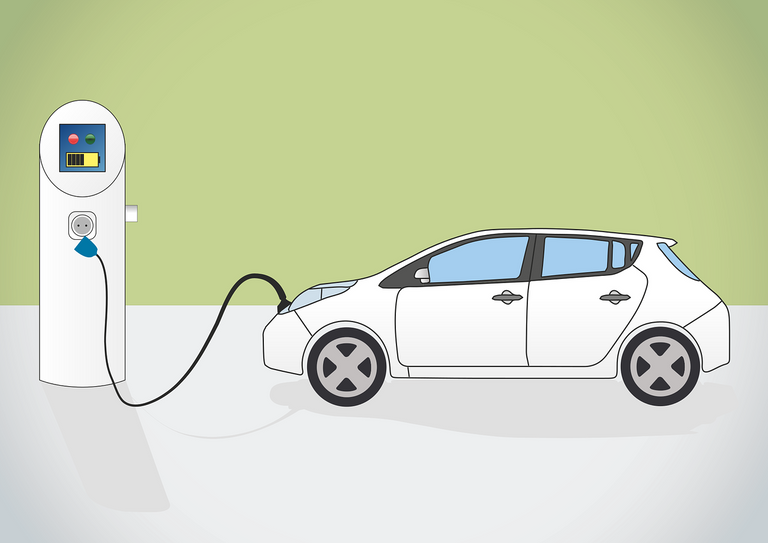
Image from Pixabay
"what are the newest cleaning methods to try and deal with the waste?" @doitvoluntarily
First of all, the nuclear waste handling is at quite sad state right now. Almost all nuclear waste storages are only meant to be temporary. Sadly almost no party has invested in having permanent solutions for the nuclear waste issue, even though there has been research on how to handle/reuse nuclear waste.
The good news is that the first permanent nuclear waste storage is being completed in Finland, which is designed to have multiple layers of protection to prevent nuclear waste from leaking into the nature. The used fuel rods will be inserted in capsules, which will be covered in copper. The copper tubes will be inserted in a hole, which will be filled and covered with bentonite. This all will be under 400-500 meters of bedrock. Even though this is not specially high tech, it's still first of it's kind and might be an example of future nuclear waste storage. Source
This is a big step forward from the temporary storages used.
This is not new technology either, but personally I'm most excited about breeder reactors, which would allow better recycling of nuclear fuel. Currently the nuclear waste from reactors can be recycled to a certain degree, but breeder reactors allow far more sustainable nuclear fuel usage. At best, the re-used nuclear waste would reduce the need of exavating new nuclear fuel material AND the re-used nuclear fuel would produce waste which is significantly faster to become safe. The waste should be safe in just a few hundred years.
You can read more here about recycling nuclear fuel and breeder reactors.

Source Whatisnuclear.com
"Do you think it is wise to build nuclear reactors on fault lines? e.g. Should Japan be running Nuclear or switching to alternative energy like wave?" @abh12345.stem
Short answer: I think it's still wise, even wiser with modern solutions. However, if the technology used in wave power facilities and/or energy storage for solar/wind are improved significantly, they should be used. The current issue with wave power is that it can't prefectly utilize the wave energy and the wave power plants designs are somewhat easily damaged by storms.
As you mentioned Japan as an example, I think of Fukushima power plant. I've understood that even in Fukushima the situation would have been controllable if the back-up diesel generators would have been located better, but instead they were covered in water by the tsunami. At this point it would be mostly safe to say, if the possible design issues are avoided, nuclear energy would be safe even in fault lines. However as there is always a risk of something gone wrong, it's best if there's always multiple layers of safety.
Seismic activity is a risk for nuclear power plants of course, even without the risk of a tsunami hitting the power plant. The nuclear power plant needs to be designed in a way it can withstand even stronger earthquakes, but this shouldn't be an issue. However, more modern nuclear reactors should be safer.
The new generation of smaller sized nuclear reactors are designed for mass production, but also to provide better safety solutions. The reactors are designed to have less power in one reactor, but with more reactors in a single power plants if needed. With the reactor power being lower, they have been designed to work with passive cooling. This was a technical malfunction should not cause the loss of cooling. One of the modern reactors is NuScale which has passive cooling systems, you can read more from here.
Creating passive safety systems creates a new, remarkable layer of safety for nuclear plants even in areas with high seismic activity. The modern design allows the reactors to remain safe even in a blackout situation.
So to answer your question again, yes. The older power plant safety must be evaluated, but with modern technology we can still safely build more nuclear power to fault lines.
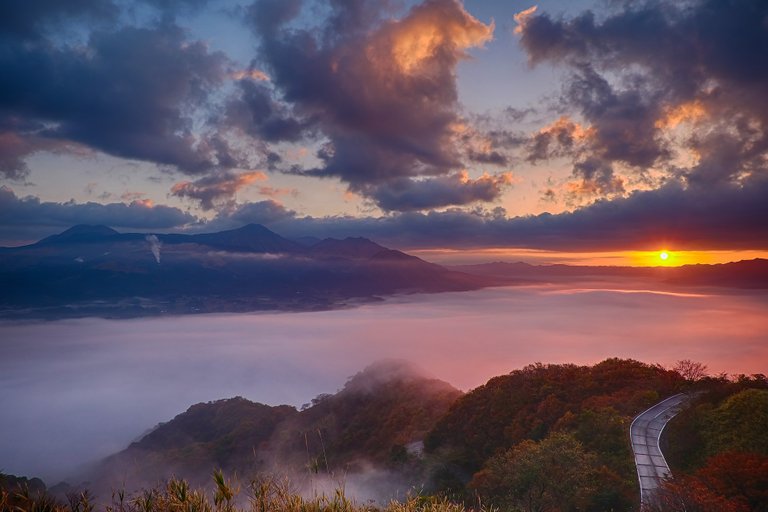
Image from Pixabay
"Considering the contamination and pollution and subsequent damage fossil fuels does to our bodies through the air, water and food chains, is nuclear safer?" @tarazkp
Yes, especially when nuclear power plants are used safely and the nuclear waste is stored safely. We've had some nuclear accidents in the past, as you might have heard of Chernobyl and Fukushima, the death amounts caused by fossil fuels is completely on different level. When comparing deaths per TWh produced, the nuclear is hundreds times safer than brown coal alone. In the history, the hypothetical amount of deaths caused by nuclear energy is estimated to be approx. 11000, when the similar number with brown coal alone is over 5 million. If coal and oil are added with brown coal, the total amount rises to over 11 million. Source
Now compare the 11 million to 11000.
The nuclear safety is improving constantly and the nuclear waste storage and recycling are constantly improving. New nuclear reactors are safer than old ones, while the fossil power plants will still cause CO2-emissions. In addition to this, coal ash is also radiactive and even though it's not as radiactive as nuclear waste is, coal ash storage is not as strongly regulated. Source
Nuclear energy is frightening to the masses, but fossil fuels are far more dangerous. As crazy it is, building more nuclear power could save lives.
"Is fusion reactor a thing? To what I've understood it is pretty much sci-fi at this point, but let's say it was a thing: How would it be different from fission and it's usage in real world?" @celestal
Fusion reactor is kind of a thing. A functional fusion reactor does not exist yet, but it's being constantly developed. Some do not believe we'll ever reach actual use of fusion power, but we can't know if we don't try!
The main difference of fission and fusion is that fission produces energy when the atom splits up. From one atom we get two smaller atoms. Fission reaction requires fissile materials, which are quite rare and fission reaction causes nuclear waste. Fusion reaction however could be done with hydrogen and wouldn't produce any nuclear waste, but instead helium.
The most known fusion reaction is what we can see in the sun and the stars. They're powered with a fusion reaction.
If a controlled fusion reaction could be produced, it could be a very potential source of energy without emissions and waste we're currently suffering from. People are calling fusion energy as a source for unlimited clean energy, but especially the statement of "unlimited" is something I personally try to avoid.
You can read an article about the Chinese who are trying to overcome obstacles on our way towards fusion power in the article found here.
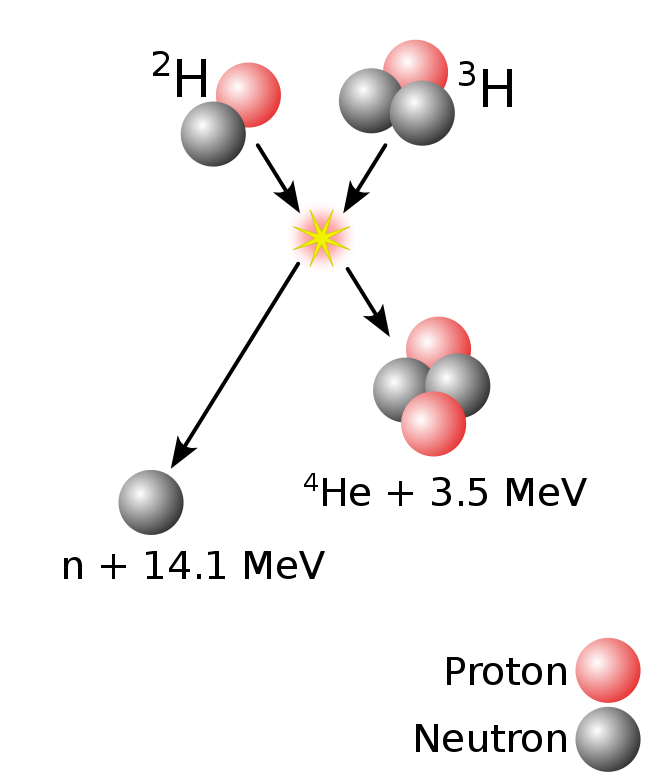
From Wikimedia Commons
"Second question: Is there any way to make the leftover radioactive waste from the nuclear reaction non-radioactive?" @celestal
I covered this question partially above, but there is no direct way to make radioactive waste to non-radioactive waste, unless if you accept the recycling of the nuclear waste and re-use it in a suitable reactor type. As a result we'd get safer radioactive waste which is dangerous only for hundreds of years, not thousands of years like the typical radioactive waste.
It's not the perfect solution, but still a huge improvement. This is the same link, but read here about nuclear waste recycling.
"It seems to me that if nuclear fission were not a big part of generating carbon free power, then it would be impossible to decrease carbon dioxide emissions sufficiently and fast enough to mitigate global warming while not causing a serious energy shortage. This is a hotly debated issue but where do you stand in this?" @markkujantunen
I think we should invest more in nuclear energy. I'm typically pro-marked kind of person, but I'd like to see government investments too so we can get something done in a faster schedule. Germany is a good example how their plan was to reduce CO2-emissions by phasing out nuclear and investing in renewable energy.
It hasn't worked out so far and France, which has a lot of nuclear, is still producing clearly less CO2. Germany is producing almost double CO2 per capita compared to France. Source
Say yes to nuclear energy!
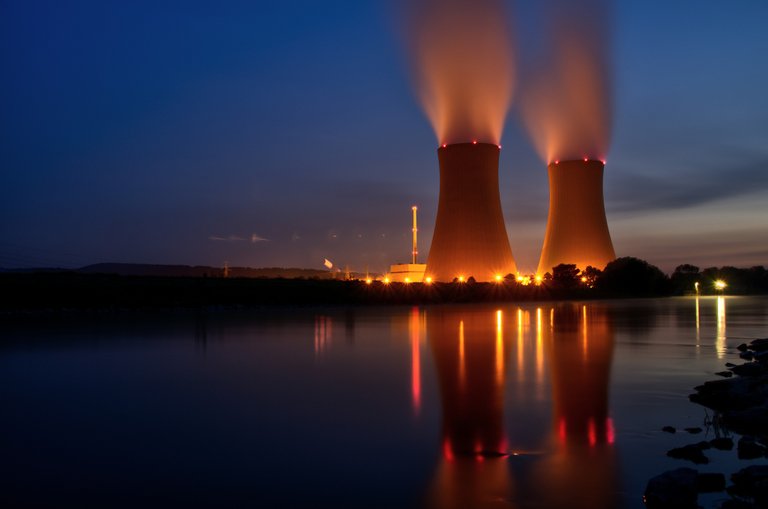
Image from Pixabay
"Why is the half-life of neutrons around 10 minutes even though they do not decay in the nucleus of an atom?" @inertia
This is approximately the half-life of free neutrons. When the neutrons are paired with protons in an atom, they do not decay.
This appears to be an example of beta decay.
And also this question is one of the examples far outside of my comfort zone. I found some information on this, but this one answers your question the best:
"The decay of free neutrons is energy feasible because the mass of a neutron is greater than the sum of the masses of the proton and electron it decays into. But where a neutron is paired with a proton its decay is not energy feasible and thus such neutrons within nuclei are stable." Source
"Nuclear energy is IMO the only way to reduce our carbon emission and maintaining at the same time our way of living. However, nuclear waste is a clearly identified issue. If only governments could put more money both in the associated research and in the development of alternatives (I find it not enough funded by a large factor)..." @lemouth
I'm quite sure that this is not a question, but I still included it so I can comment on this. Nuclear energy is currently the best way to cut carbon emissions, as low-emission renewable energy can't be stored in a proper way. We need a revolution in the energy storage systems before solar/wind will be able to solve the energy issues.
Nuclear waste handling requires more work to be perfected. Finland has been working on a permanent nuclear waste storage, but the optimal case would be a method to re-use nuclear waste. If this is not possible, more countries will need to construct permanent nuclear waste storages.
"Don't you think that if we continue using nuclear energy, there will be more pollution due to nuclear waste?" @ladybee
Nuclear waste is a very different kind of pollution and it can be controlled and contained, unlike most pollution from fossil fuels. As mentioned above, there are ways to store or use nuclear waste in very safe ways.
Calculations have been made what would be the impact to humans living near the nuclear waste storage, if the nuclear waste containers in Finnish Posiva nuclear waste storage would start to leak after 1000 years. The annual increase in radiation dosage per person would be approx. 0.0002 mSv/year. Currently the average annual radiation dosage in Finland per person is 3.2mSv/year. Source
So even if the nuclear waste container would break too early, it wouldn't cause threat to people living close to the nuclear waste storage. At least if the nuclear waste storage is a proper one, and not in your garden shed.
If we use nuclear energy, we might have an issue with nuclear waste. If we do not use nuclear energy, we will very certainly have a lot of issues with global warming.
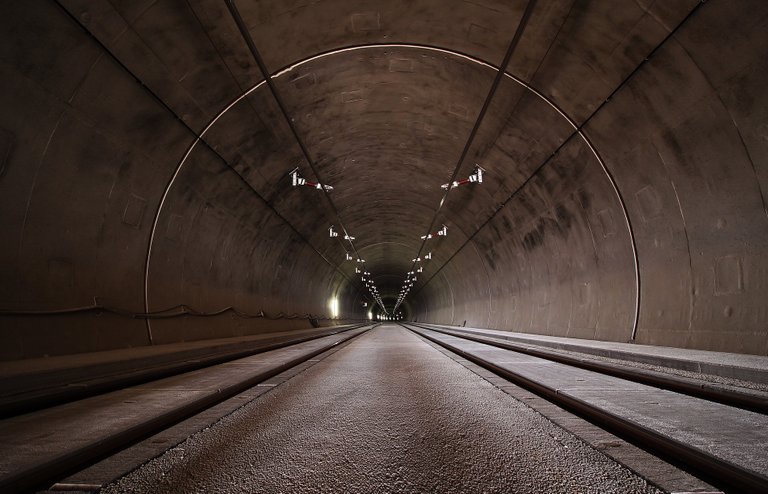
Image from Pixabay
"Is nucular a word?" @enn0
It's not an actual word, but some pronounce the word "Nuclear" as "Nucular". Some major dictionaries mention this, but nucular itself is not a real word. It is a well known way to mispronounce nuclear, so even some major dictionaries like Merriam-Webster has mentions it: "pronunciations ending in -kyə-lər\ have been found in widespread use". Source
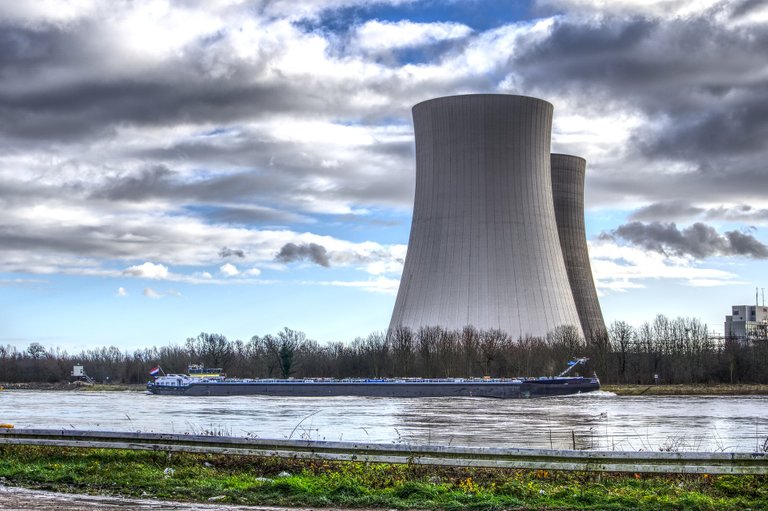
Image from pixabay
Nice from you to come back to so many users!
I agree with you: finding a way to reuse the waste is the way to go. The temporary/permanent storage options are not options in my opinion, as it is hard to project ourselves on time frames as long as those associated with the life-time of the problematic elements.
Germany is producing very little CO2 sometimes during the year. The problem is when their renewable energy plants are not producing enough and that the coal plants are switched on. Then Germany is producing way more CO2 than anyone else. In contrast, the amount of CO2 per capita released by France is much more constant all over the year.
A good point. The current energy storage solutions are not cost-efficient enough in a very large scale, which causes most renewables to be backed up by fossil fuel power plants.
As solar and wind power do not provide the consistency required, but I'm hoping a leap in battery technology can help to solve this. Sadly while we're waiting for it to happen, coal/oil/gas plants are turned on when renewables can't produce enough energy.
wonderful format for a post, or, indeed, a small series of it! I might “borrow” your idea one of these days 😇Goodness me @apsu! What a
I’ve learnt a lot from this article. But, the two questions that interested me the most were @doitvoluntary’s and @abh.1234.stem's ones.
I once witnessed a conversation about nuclear power programs in Chile (do they have power plants by now?), they have energy issues over there. I never thought this could be something even reasonable to consider! I feel less ignorant now 😊 But, I was even more interested in your brief discussion about a promising nuclear-fuel recycling technology, and the already existing safe way of storing nuclear waste in Finland. I see at light at the end of the tunnel.There is still hope for the future of our environment.
Now, I am going to google: betonite! What is that?
This is a very creative and informative post!
Thank you
Thank you and I'm glad you enjoyed the read!
This was possible only because the great questions users had sent me. I was afraid I would get only one or two questions, but I got so many good questions I had to make this post quickly before any more questions would appear.
I'm glad to hear of your experiences and thoughts about the topic. There will be challenges with nuclear-fuel recycling and storage, but we're seeing development on the field. Hopefully people will be ready to accept the tools we have.
And hope you found the answer on google. It's not betonite, but bentonite. For a brief explanation, you can read a bit on wikipedia:
https://en.wikipedia.org/wiki/Bentonite
Thank you for the comment!
Bentonite
Bentonite () is an absorbent aluminium phyllosilicate clay consisting mostly of montmorillonite. It was named by Wilbur C. Knight in 1898 after the Cretaceous Benton Shale near Rock River, Wyoming.The different types of bentonite are each named after the respective dominant element, such as potassium (K), sodium (Na), calcium (Ca), and aluminium (Al). Experts debate a number of nomenclatorial problems with the classification of bentonite clays. Bentonite usually forms from weathering of volcanic ash, most often in the presence of water.
Awesome, you DID answer!
Pretty nifty pieces of information in here, thanks.
Great idea of you to do sort of a Q&A!
I do really think that nuclear energy is demonized in the last years while, when incorporated correctly, could greatly reduce the footprint of energy on the climate.
I recently also came across the concept of Small Modular Reactors (SMR's). With a modular design, power plants require significantly less construction costs, can be manufactured more efficiently and are scalable to as much energy is needed. And due to their smaller size and design they have less complex systems and are less vulnerable to failures. I see you already mentioned those briefly in the question about the fault lines, but I think that these might have the potential to change the public opinion of nuclear plants being large ticking time bombs to small and efficient power sources.
I do think SMR's will be a real gamechanger. They should help in so many things people are worried about, not only limited to it being cheaper and even safer. When they can be mass-produced, they can get type approved instead of every single design to be approved individually. This might seem as an insignificant point, but it helps a lot with the bureaucracy.
The SMR's can also be used to replace heat producing plants in colder climates. At least in Finland we have power plants designed to produce district heating, but they're mostly fueled by coal, wood or peat. I would be happy to see smaller cities having their own SMR's to produce required heating for the city instead of needing a fossil fuel powered plant to do that.
thanks for taking the time to answer all of those questions, great post!
I know that in general people usually have some questions in their mind, but they don't know from where they could ask. In the best case, I'll learn more when trying to find out the answers :)
Tomorrow World what Technology is there just hope that it will not going to hurt environment and people should have to adopt some changes so that we are not hurting our mother nature. Stay blessed.@apsu, No matter in
Posted using Partiko Android
This post has been voted on by the SteemSTEM curation team and voting trail. It is elligible for support from @curie and @utopian-io.
If you appreciate the work we are doing, then consider supporting our witness stem.witness. Additional witness support to the curie witness and utopian-io witness would be appreciated as well.
For additional information please join us on the SteemSTEM discord and to get to know the rest of the community!
Please consider setting @steemstem as a beneficiary to your post to get a stronger support.
Please consider using the steemstem.io app to get a stronger support.